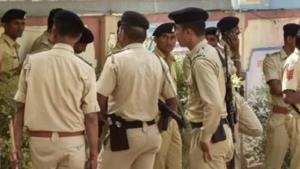
Gujarat ATS Busts Al-Qaeda-Linked Module, Arrests Four in Major Counterterror Operation
In a significant breakthrough in India’s fight against terrorism, Gujarat’s Anti-Terrorist Squad (ATS) arrested four individuals in Ahmedabad on Wednesday for their alleged links to Al-Qaeda in the Indian Subcontinent (AQIS), a banned terror organization affiliated with the global jihadist network Al-Qaeda. The arrests were made after sustained surveillance and intelligence gathering by the state’s ATS.
According to a statement released by the ATS, the four suspects were apprehended during a coordinated operation in different locations in and around Ahmedabad. The arrested individuals have been identified as Mohd Faiq from Delhi, Mohd Fardeen from Ahmedabad, Sefullah Kureshi from Modasa in Aravalli district of Gujarat, and Zeeshan Ali from Noida, Uttar Pradesh. All four were reportedly in contact with AQIS handlers and were under the agency’s radar due to their suspicious activities.
Gujarat ATS Deputy Inspector General Sunil Joshi confirmed the arrests to the media and emphasized that the suspects were being monitored for some time due to their suspected links with AQIS. He added that the operation was carried out based on actionable intelligence inputs and that the arrests represent a major blow to extremist efforts aimed at spreading radical ideologies and planning attacks within India.
AQIS, formed as a regional wing of Al-Qaeda, has been active in promoting extremist ideologies and recruiting individuals from various parts of South Asia, including India, Bangladesh, and Pakistan. The group aims to wage jihad against governments in the region and establish an Islamic caliphate.
The timing of these arrests is particularly significant, coming just months after the deadly TERROR attack in Pahalgam, Kashmir, on April 22, which claimed the lives of 26 people—most of them tourists. That incident underscored the persistent threat posed by extremist groups operating in or targeting India. In response, law enforcement agencies across the country have intensified counterterror efforts.
Further reinforcing these measures, the Counter Intelligence Kashmir (CIK) unit launched an extensive crackdown on Saturday across multiple locations in the Kashmir Valley. Raids were conducted at ten sites in Budgam, Pulwama, Ganderbal, and Srinagar districts in connection with an ongoing terror case. Ten individuals were detained for interrogation during these operations, according to the Jammu and Kashmir Police.
This recent operation by the Gujarat ATS follows a similar crackdown last year when the Delhi Police, in coordination with intelligence agencies from Jharkhand, Rajasthan, and Uttar Pradesh, dismantled a suspected Al-Qaeda-inspired terror module. That multi-state operation led to the arrest of 14 individuals who were reportedly plotting high-profile terrorist attacks across the country. The group, believed to be led by Dr. Ishtiyaq from Ranchi, aimed to establish a “Khilafat” and carry out violent acts to destabilize the country.
During the operation, six suspects were apprehended from Bhiwadi, Rajasthan, where they were reportedly receiving weapons training. The remaining eight were arrested from different locations in Jharkhand and Uttar Pradesh. Authorities also recovered arms, ammunition, and radical literature, all pointing toward a well-organized plan to carry out terrorist acts.
These successive crackdowns highlight India’s proactive approach to neutralizing terror networks and preventing radicalization, especially in the wake of increasing cross-border and homegrown threats.

